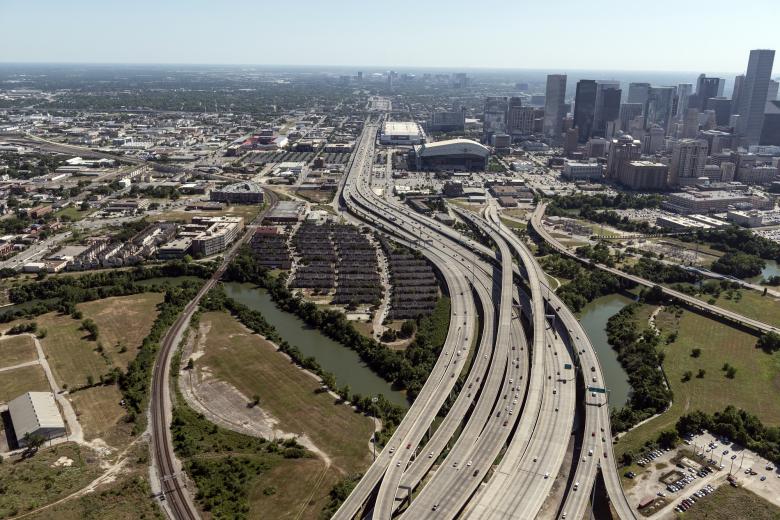
The Texas Department of Transportation is allegedly threatening retaliation against the whole Houston region because advocates continue to fight a highway expansion that the agency knows will have a harmful impacts on communities of color — but if the advocates successfully get the initiative shut down, it could be a model for other communities fighting bad road projects of their own.
In a Dec. 16 civil rights complaint filed with the Federal Highway Administration, a coalition of regional advocates accused the Texas DOT of continuing to press for the North Houston Highway Improvement Project, despite the fact that the notorious highway expansion is already the subject of an ongoing federal civil rights investigation that has prevented the agency from soliciting contracts to build it since March.
The complainants also say the agency used a manipulative public comment process to successfully campaign to get the "improvement" project — which has long been on the list of great American highway boondoggles — included in its 10-year plan without addressing advocates' concerns, and then threatened to reallocate funding intended for other Houston-area transportation initiatives in retaliation against local officials who have opposed their efforts.
We’ve partnered with @airallianceHOU, @LINK_Houston, @StopTxDOTi45, and @TexasHousers to file a complaint against @TxDOT’s proposed highway expansion that will adversely affect Black and Brown populations in Houston.
— Texas Appleseed (@TexasAppleseed) December 16, 2021
Check out the press release: https://t.co/ZjUZUn7QUl pic.twitter.com/6nfukiG6XS
Largely focused on Interstate 45, the North Houston Highway Improvement Project would re-route and expand about 25 miles of Texas freeways, displacing nearly 1,000 households (including 486 residences specifically serving low-income people), 344 businesses and scores of critical community services in the process. The people who would suffer those losses are overwhelmingly Black, Hispanic, and Latinx, who make up between 76 and 87 percent of the residents in neighborhoods along the corridor, and who already suffer disproportionate rates of asthma and other pollution-related diseases.
If they succeed, the complainants will be among the first in the nation to successfully make the case to the federal government that a 21st-century highway project is deliberately discriminatory — and that the impacts on communities of color are not a price worth paying for larger regional goals.
"We’re perpetuating and exacerbating the impacts of [highway projects] that have already had racist impacts for generations," said Madison Sloan, director of the Disaster Recovery and Fair Housing Project at public interest justice center Texas Appleseed, which co-authored the letter. "One of the ways TxDot justifies inflicting increased air pollution on BIPOC communities is that air pollution will go down regionally. But the regions where pollution will go down are predominantly White and wealthy. ... We are extremely concerned about TxDOT’s extraordinary commitment to pushing through the North Houston Highway Improvement Project as-is, even though they’ve been told repeatedly that it’s discriminatory and imposing incredible burdens on communities of color."
US DOT @SecretaryPete said today that @latimes reporting on the more than 200k people displaced for freeway projects over the last 30 years was "very concerning" and that the agency was beefing up its civil rights office to oversee projects funded by the new infrastructure law.
— Liam Dillon (@dillonliam) December 9, 2021
Sloan and her colleagues say that if the federal government shuts down the Houston project, it could send a powerful message to state DOTs across the nation that using federal dollars to build discriminatory highway projects will no longer be tolerated.
"What happens in Houston could be a model for the country,” said Ines Sigel, interim director of LINK Houston, which also participated in the complaint. “Enforcing the civil rights of the most affected people can move us towards an equitable transportation system that improves mobility, health, and the environment for everyone.”
That message may be more timely now than ever. The recently passed Infrastructure Investment and Jobs Act contains a historic $110 billion in largely unrestricted funds for surface transportation agencies, which many fear will be used to expand highways like I-45 without strong federal intervention that past administrations have been reluctant to exercise.
The Federal Highway Administration has already issued strong guidelines that direct states to only spend the money in ways that advance the equity, safety and health of underserved communities, but advocates say the results of the Houston investigation will test the agency's resolve to actually stop projects that fail to protect the civil rights of every resident.
And if it doesn't, advocates fear that the familiar arguments TxDOT has offered in support on the project could win elsewhere, too.
The agency did not respond to a request for comment, but it's defended the highway expansion to local media in the past, citing a 15-year planning process and numerous rounds of surveys and public meetings.
Advocates, though, say said those meetings weren't necessarily meaningful. In late June, the agency opened public comment on a 10-year Unified Transportation Program that included a question about the paused I-45 expansion, but only allowed residents to note whether they supported "maintaining project and funding as proposed" or "removing project funding," with no space to discuss alternative options to address the aging highway, like repairing the most heavily damaged segments, or outright tearing them down.
"Doing community meetings is not the same thing as actually listening," she added. "For 15 years, TxDOT has consistently gotten feedback that the [project] as it stands is discriminatory towards communities of color, and better alternatives exist. They’ve had this feedback for 15 years, and they’ve ignored it."
'An ongoing movement'
When it comes to feedback from their colleagues, Sloan and her colleagues say TxDOT has been even less responsive — and in some cases, outright retaliatory. After advocates and local and regional government officials used the public comment period on the final environmental impact statement for the project to raise environmental and equity concerns, the coalition says TxDOT responded "with threats to reallocate funding if they took any action to even suggest the final environmental impact statement was not compliant," citing an internal letter.
Time will tell whether those allegations are true — and whether US DOT agrees the planned I-45 project violates Houstonians' civil rights. But whatever the outcome, Sloan says the fight is just part of a much larger effort to reckon with the ongoing racism of America's highway programs.
"We've looked to the work that communities and advocates across the country have done on these issues as models for our own advocacy," she added. "We consider ourselves part of an ongoing movement to address infrastructural racism that originated in and is led by the most affected communities themselves."






